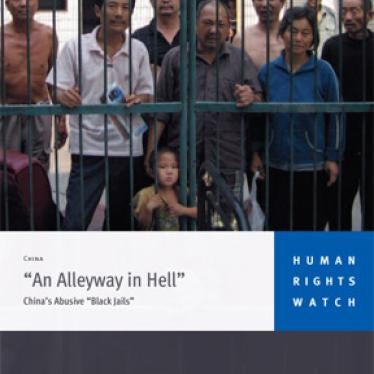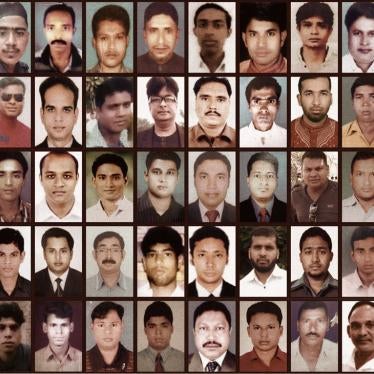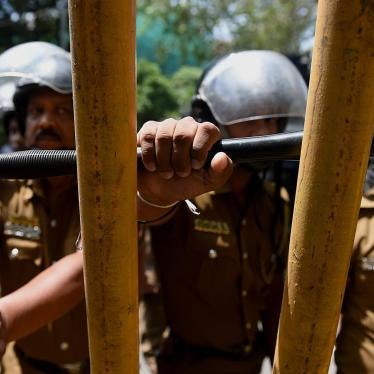(New York) - Since 2003, large numbers of Chinese citizens have been held incommunicado for days or months in secret, unlawful detention facilities known as "black jails" by state agents who violate detainees' rights with impunity, Human Rights Watch said in a new report released today.
The 53-page report, "An Alleyway in Hell," documents how government officials, security forces, and their agents routinely abduct people off the streets of Beijing and other Chinese cities, strip them of their possessions, and imprison them. These black jails are often located in state-owned hotels, nursing homes, and psychiatric hospitals.
"The existence of black jails in the heart of Beijing makes a mockery of the Chinese government's rhetoric on improving human rights and respecting the rule of law," said Sophie Richardson, Asia advocacy director at Human Rights Watch. "The government should move swiftly to close these facilities, investigate those running them, and provide assistance to those abused in them."
Human Rights Watch found that it is usually petitioners who are detained in black jails. These are citizens from mainly rural areas who come to Beijing and other provincial capitals seeking redress for abuses ranging from illegal land grabs and government corruption to police torture. Local officials, with the tolerance of public security authorities, establish the black jails as a way to ensure these complainants are detained, punished, and sent home so that these officials will not suffer demerits under rules that impose bureaucratic penalties when there is a large flow of petitioners from their areas.
The Chinese government has flatly denied the existence of black jails. In an April 2009 Ministry of Foreign Affairs (MOFA) press conference, a MOFA official responded to an Al Jazeera correspondent's query about black jails by stating categorically that, "Things like this do not exist in China." In June 2009, the Chinese government asserted in the Outcome Report of the United Nations Human Rights Council's Universal Periodic Review of China's human rights record that, "There are no black jails in the country."
Black jail guards routinely subject these detainees to abuses including physical violence, theft, extortion, threats, intimidation, and deprivation of food, sleep, and medical care.
A 46-year-old former detainee from Jiangsu province, who spent more than a month in a black jail, cried with fear and frustration as she recalled her abduction."[The abductors] are inhuman...two people dragged me by the hair and put me into the car. My two hands were tied up and I couldn't move. Then [after arriving back in Jiangsu] they put me inside a room where there were two women who stripped me of my clothes...[and] beat my head [and] used their feet to stomp my body," the former detainee said.
The majority of the former black jail detainees interviewed by Human Rights Watch said that they were abducted by individuals who provided no legal justification for detention or any information about detainees' eventual destination or possible length of detention. One 52-year-old petitioner from Liaoning province told Human Rights Watch: "I was detained by retrievers from [my home province of] Liaoning who were in plainclothes and never showed me any identification. I doubt they had any [official] identification. They never told me the reason why they detained me; they never even spoke to me and didn't tell me how long they were going to detain me for."
Black jail detainees are also subject to psychological abuse, including threats of sexual violence. A 42-year-old former detainee from Sichuan province was told by her black jail guards that if she attempted to escape they would "... take me to the male prison and let [the inmates] take turns raping [me]." Human Rights Watch also documented black jail guards' use of sleep and food deprivation and denial of needed medical care as a means of punishment or to control or elicit information from detainees. A 70-year-old former detainee from Hubei province resorted to a three-day hunger strike to compel her captors to allow her access to a doctor.
Minors under the age of 18 have been detained in black jails in blatant violation of China's commitments to the rights of children. One former detainee interviewed by Human Rights Watch was a 15-year-old girl, abducted from the streets of Beijing while petitioning on behalf of her crippled father, who was locked up in a nursing home in Gansu province for more than two months and subjected to severe beatings.
"To visit these kinds of abuses on citizens who have already been failed repeatedly by the legal system is the height of hypocrisy," said Richardson.
Black jails appear to have emerged since the Chinese government abolished laws permitting the arbitrary detention of non-residents and vagrants. While that decision was a welcome move to curb the police's powers of arbitrary detention, black jails now serve as extralegal detention centers for "undesirables" in cities. Black jails constitute an unlawful system to detain petitioners as a means to protect government officials at the county, municipal, and provincial levels from financial and career advancement penalties linked to limiting petitioning activities by citizens from their areas in major cities like Beijing. Unpublished local government documents describe penalties levied against local officials who fail to take decisive action when petitioners from their geographical area seek legal redress in provincial capitals and Beijing. In addition, the operators of black jails receive from those local-level governments daily cash payments of 150 yuan (US$22) to 200 yuan (US$29) per person, creating another incentive to employ forms of illegal detention.
The detention of petitioners is a violation of international law, which guarantees the freedom of expression, and of China's own Regulations on Letters and Visits, the law which regulates petitioning activities. Detaining anyone - even suspected offenders - without legal authority to do so and without giving the detained recourse to legal process is a serious violation of several international instruments as well as China's constitution and numerous domestic laws. Under international law, a state commits an enforced disappearance when its agents take a person into custody and it denies holding the person or fails to disclose the person's whereabouts.
"China has laws that set out how arrests and detentions should take place, but the government is blatantly ignoring those in the cases of black jails and those detained in them," said Richardson. "A failure to live up to its own legal standards - let alone international standards - is not the hallmark of a government aspiring to global respect."
Testimony from former detainees of China's black jails
"[The guards] entered without a word, grabbed me...kneed me in the chest and pounded my lower belly with their fists until I passed out. After it was over I was in pain, but they didn't leave a mark on my body."
- a former black jail detainee interviewed by Human Rights Watch
"I asked why they were detaining me, and as a group [the guards] came in and punched and kicked me and said they wanted to kill me. I loudly cried for help and they stopped, but from then on, I didn't dare [risk another beating]."
- a former black jail detainee interviewed by Human Rights Watch
"There was no medical treatment [in the black jail]. I'm not very healthy and combined with the disgusting conditions inside [the facility], I was sick every day, but they wouldn't give me medical treatment and wouldn't let me go to see a doctor. [A guard] said, ‘You don't want to die here because your life [to us] isn't worth one cent. [If] I want you dead, you can die [here] as easily as an ant.'"
- a former black jail detainee interviewed by Human Rights Watch
"Every day I could only sleep three hours and they would at any time wake me in order so that I couldn't run away. I was hungry every day, but couldn't get enough to eat. The second time I was detained for 37 days...I lost 20 kilograms."
- a former black jail detainee interviewed by Human Rights Watch







